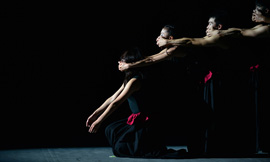
We are going to face the conflict of modern culture and traditional culture. When traditional culture rotted by modern culture, where should the traditional culture go? It does not mean that traditional culture and modern culture cannot coexist. They need to merge each other and address the contradictories continuously, which may be the best explanation. As the younger generation, we have the obligation and responsibility to reignite the brightness of traditional culture. We will find that traditional culture and modern culture could balance themselves in certain areas, and Roots will have it all explained.Root, the cradle of primary, breeding, feeding, educating;Root, the home of spirituality, peace, pure, true;Root, the fetter of tenderness, care, bloodline, origin;Root, the boundless support, free, inclusive, purifying… Baima CirenBorn in Xigaze, Tibet, he has loved dance since a very young age, has won awards from National Dance Competition, Lotus. Dance Competition, Tao Li Cup and other competitions held by CCTV for many times and received the praises from professionals.2002 - 2008 Shenyang Institute of Musical Dance2008 - 2010 Tibet Autonomous Region Song and Dance TroupeEnd of 2010 - present Tangka Dance Studio in Beijing
Drama
2013